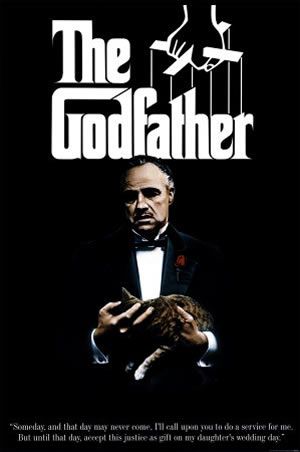1972
And now we reach a personal milestone for me in this project. After 71 movies watched, we arrive at this… The First Best Picture Winner I’d Already Seen (in its entirety).
I mean I’d seen parts of Casablanca, my mother tried to raise me right, but to my shame I had not given it my full attention and asked to watch a Cheers episode partway through, I guess I’m cancelled now.
(In terms of box office champs I’d seen, this is… second or third. I might have seen Mary Poppins, I’d definitely seen Snow White. So first non-Disney.)
It hasn’t been hard for friends to guess which film on the list that might be, so let’s get to it.
The Joint Champion
Hell and damn yes, The Godfather, what a splash Francis Ford Coppola made with this one.
Summing up the plot of this movie feels a little pointless? Like, either you know it, or you should watch it immediately? Basically aging mob boss Vito Corleone gets in a fight with an upstart rival over whether to sell narcotics, and only Michael, the one son not involved in the Corleone business, can save the family, as the darkness of his father’s empire consumes him. That one sentence covers a lot, just a lot, it’s a three hour movie and it’s earning every minute.
The cast is fantastic. Al Pacino, Robert Duvall, James Caan, and various Italian character actors (including Batman: Mask of the Phantasm’s Abe Vigoda) are all killing it. This was kind of a comeback movie for Marlon Brando, who Coppola had to fight the studio to cast as Vito, as he’d had a kind of rough go in the 60s, with multiple bombs and a reputation for being difficult. The… the second thing didn’t end.
Coppola’s filming is superb. The mise en scene, lighting, sound design, use of music, all build perfect atmosphere. He knows when and how to zoom in or out to create a perfect effect, such as the first shot, where he pulls back from the man asking a boon of Vito until he’s moved into the background while we watch over Vito’s shoulder, it’s great. Or when Michael visits the hospital (you either know or you should find out, not be told)… the sequence is so masterfully assembled I was racked with tension the whole time, and I had seen the movie already. I already knew almost everyone who died, and if not exactly when, certainly how, I knew to panic if there’s a orange on screen, but still. Utterly tense.
It’s so good. It’s just so good. And audiences knew it, because it was a juggernaut. It made twice as much as number two at the box office, more than even Sound of Music could pull in doing roadshows.
Like… my only notes are that the repeated and lengthy time jumps in the third act are a little dizzying, and the second act plot arc where Michael, hiding in Italy, meets, courts, marries, and loses a woman all in less time than it takes for some facial bruising to clear up, doesn’t feel 100% necessary? I mean I guess it informs Michael’s full descent into darkness, that’s important, so maybe 70-80% necessary? 85%? That range.
And Rotten Tomatoes Says: They rank it 7th, which places it 3rd among movies released more than six years ago.
What’s New, Hollywood? There had been gangster movies (which we haven’t discussed) and outlaw movies (one of which we did discuss), but the modern mob movie was surely born with The Godfather. Coppola walked so that Scorsese could run. Also, the utter lack of opening credits was a whole new thing, but that added so much to the opening scene. By the gods, having the full list of credits at the end of the movie will be the standard before this decade is out.
Other Events in Film
- Bob Fosse’s Cabaret brought a new style of movie musical that proved to be The Godfather’s primary awards competitor. Fosse beat Coppola for Best Director at the Oscars, and Joel Grey beat Pacino, Caan, and Duvall for Supporting Actor at both the Oscars and the Globes. (Godfather didn’t have a competitor for Best Lead Actress, so that was Liza Minnelli’s category basically everywhere.)
- The Poseidon Adventure is one of the better known 70s disaster movies.
- Deep Throat must be the only porn movie to make the top ten at the year’s box office.
- Ralph Bakshi brought adult content to cartoons in the X-rated Fritz the Cat, thought to have opened doors for many adult cartoons down the road, such as The Simpsons and Family Guy.
- Play It Again, Sam isn’t a line from Casablanca, it’s the title of a movie written by and starring (but not directed by) Woody Allen, which isn’t the biggest thing he did that year (that’s Everything You Always Wanted to Know About Sex), nor was that inaccurate reference tp Casablanca the worst thing he ever did (you… you must know what that is).
- Blaxploitation comes to horror films with Blacula.
- Underground auteur John Waters releases his best known flick, Pink Flamingos.
- There’s a lot I could discuss about The Last House on the Left, including the much older story it comes from and the utter sea-change in a basic facet of society this version reveals, but let’s just note that it’s the official feature directorial debut of one Wes Craven. (He claimed to have done some X-rated work under pseudonyms, but we don’t know what exactly or if one of them was definitely Deep Throat.)
- Shaft returns for Shaft’s Big Score.
- And Now For Something Completely Different comes to America. If American comedy nerds didn’t know the dead parrot sketch before, they did now.
- Film debuts include John Lithgow, Steve Martin, Ben Kingsley, Jodie Foster, and Samuel L. Jackson.
Next Page: A Double Act and a Demon

